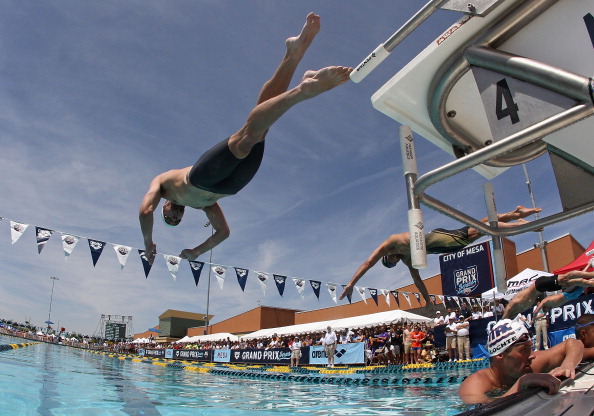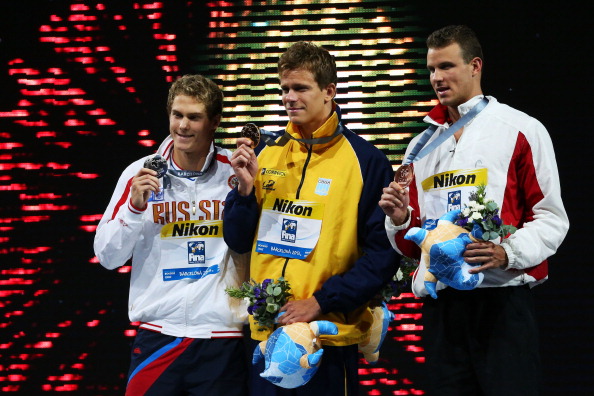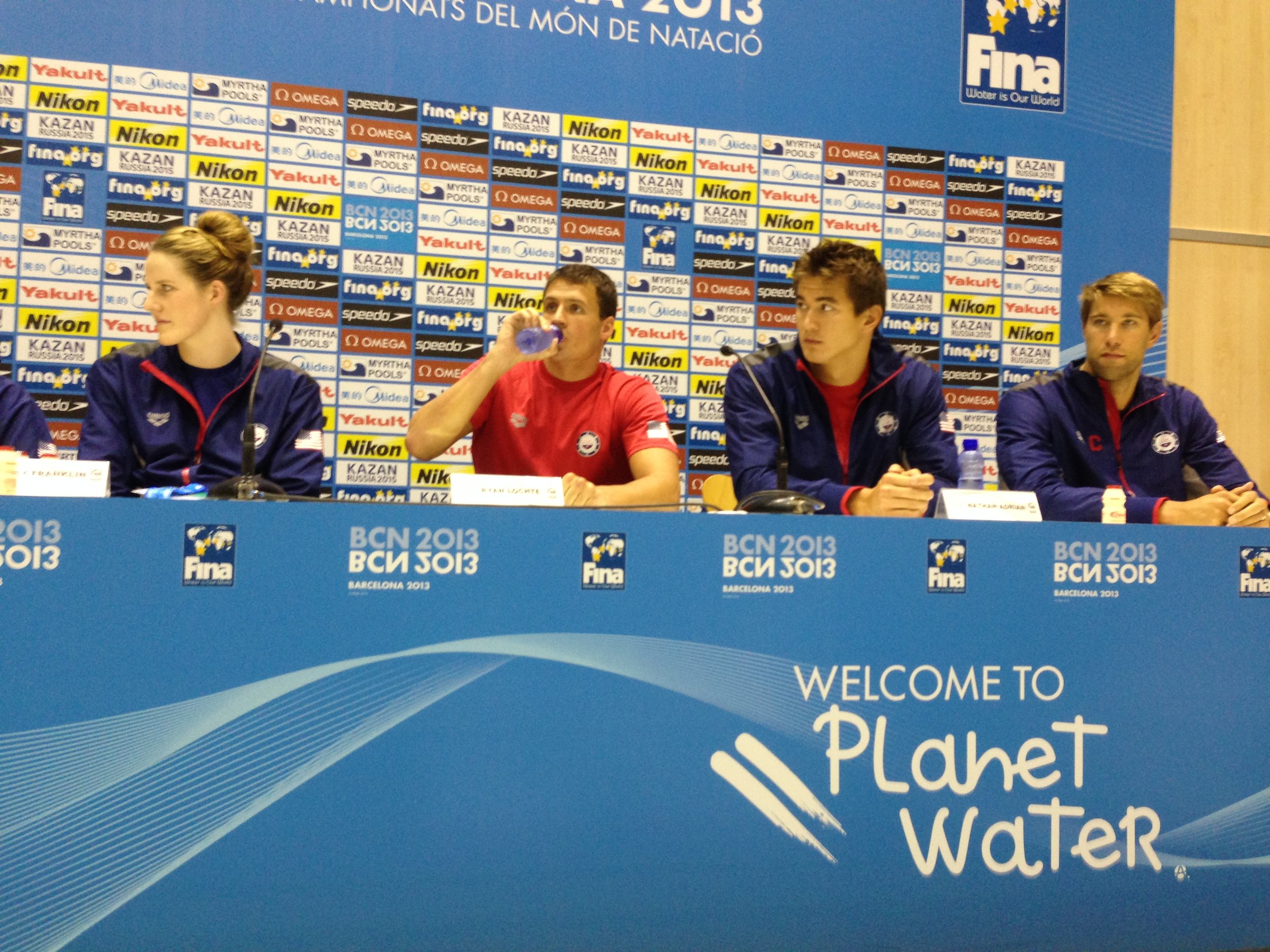Michael Phelps had it Friday morning, turning in a sensational prelim swim. He didn’t quite have it Friday night when it counted, losing by one-hundredth of a second in the 100 butterfly to Tom Shields at the U.S. national championships in Irvine, California. The upshot: Phelps is back on the national team. For him, for the U.S. team, for swimming in general, that’s all good. Now, though, the real work begins. As Bob Bowman, his longtime coach, said Friday night, “I think he needs to go home and put in some more practices.”
All that is going to have to wait until after the Pan Pacific championships later this summer in Australia, when the Phelps phenomenon goes overseas — in essence, more under-the-spotlight practice time for Phelps to work on his 100 fly, 100 freestyle, 100 backstroke and 200 individual medley. There may be moments of greatness. There also may be moments of, say what?
Remember, these nationals were only the fifth meet of the Phelps comeback after a 20-month competitive layoff.
The race Friday night not only marked Phelps’ best chance to get back onto the international stage for the next two years — a quirk of the USA Swimming rules for this summer’s Pan Pacs and, presumably, next year’s world championships in Russia — it also underscored just how much more work lies ahead for Phelps himself before the 2016 Rio Olympics and, as well, how much better swimming itself has gotten in the two years since the London Games without him and, of course, directly because of him.
Phelps had finished seventh in the 100 free on Wednesday, missing the turn in the shadows.
He has other races on the program: the 100 backstroke and 200 individual medley.
Phelps is the London 2012 200 IM champion. But that race is altogether a different sort of test for someone who has been back at it for months, not years.
And the 100 fly has been one of his mainstays.
Phelps is the gold medalist in the 100 fly at the last three Olympic Games and, moreover, at the 2007, 2009 and 2011 world championships.
He is the world-record holder in the event, 49.82, set in a memorable duel at the 2009 Rome worlds with Milorad Cavic.
Phelps is of course the holder of 22 Olympic medals, 18 of them gold.
What gets obscured in the glare of all that gold, however, is what it took to get there, and an elemental premise:
Swimming is hard.
Not to say other sports aren’t.
But at the elite level, swimming always — to repeat, always — reveals whether a racer has put in the work.
This is what Phelps learned, to his detriment, at the Shanghai worlds in 2011. He had not put in the work. Ryan Lochte had. Lochte had an awesome meet. Phelps, to be gracious, did not. Phelps acknowledged as much, and put in just enough to come back in London to win six more medals, then go on his retirement tour.
Now he is back.
The Phelps who went eight-for-eight in Beijing was a guy who over the years put in ferocious amounts of work. He and Bowman famously did not take off weekends or holidays.
With two years now until Rio, the question now in front of Phelps and Bowman is elemental. The work is there to be done. Will it?
Phelps’ legacy is assured. He is the greatest Olympic athlete of not just our time but all time. What he chooses to do is up to him.
Before these recent meets, he has acknowledged nerves — very un-Phelps like. And he knows why, too, saying it’s because he hasn’t put in the training to feel ready to do what’s necessary. That training not only lends fitness, it gives him a feel for what’s what — so, for instance, he doesn’t glide turns, like he did in Friday’s final.
Shields, the winner already here of the 200 fly, finished the 100 in 51.29.
Phelps touched in 51.30, done in by nerves and by a crummy turn mid-way. Typically, Phelps takes 16 strokes in the first half of the 100 fly. This time, it was 16 strokes and a glide before the turn. That cost him.
After the race, Phelps said, “Bob and I were talking: if I want to go 50-point, or if I want to go better, I need more. I need more training. I need more endurance. I need to feel more comfort with my stroke. There are just a lot of things that need to happen. I understand that.”
Bowman: “It’s not fitness. It’s the knowledge that he’s getting up there against these other guys who are on fire and he knows what he has done to get here. And it ain’t what he used to do to get here.”
Phelps also said, “I just felt out of it, not my normal self at finals.
“Normally, I’m very relaxed, very ready. Like Bob said, it’s probably because I’m not used to being in this kind of shape, I guess, shape or this kind of feeling going into a meet. Normally, I can look back and say I’ve done all the training, I’ve done everything I’ve needed to do to prepare myself. You know, with having a year and a half off, and maybe not really going as hard as I probably should have at some of the parts during the year, it shows. And that’s something I understand.
“There are things like this that help me and motivate more than anything else. I’m somebody who can’t stand to lose. I don’t care if it’s by a hundredth or five seconds … I can not stand to lose. This will definitely motivate me … this will definitely be something that sticks with me over the next year leading up to, hopefully, world championships.”
Two years until Rio seems like a long time. It is. And yet — it’s not.
Before this meet, Phelps acknowledged that his swimming and fitness are still very much a work in progress.
When he got back into the water, he said, he was 30 pounds overweight. So he cut out red meat for six months. When did that end? “I pretty much just ended it.”
His freestyle had “been off over the last couple of weeks,” Phelps said, Bowman elaborating that “we always did everything for a 200 before, and then the 100 kind of came out of that, and now we’ve been really trying to do it for a 100 and it’s not — he’s just getting used to that, the tempo and stuff of it.”
Asked about doing a longer race, like a 200 free, Phelps said, “I’m not anywhere close to being able to swim that race at the level I would want to swim it at.”
The thing is, while Phelps is working his way back, the world is not going to be standing still. Shields said Friday night that he had grown up — nearby, in Huntington Beach, California — “worshipping” the likes of Phelps and Ryan Lochte, watching them on TV six years ago in Beijing.
Now he and many, many others are absolutely wanting to take down Phelps or, for that matter, anyone.
Five years ago, in Rome, 43 world records went down. This was at the height of the plastic-suit craze. The experts thought some records might stand for 20 or more years.
Now, it seems, each and every record is potentially at risk.
Why?
Because, in large measure, Phelps has inspired a huge new wave of talent.
And what did Phelps always say was his primary goal, above all else? To grow the sport. So he has only himself to thank for the enhanced competition.
Reading out the start lists from the 100 fly final: six of the eight guys swam lifetime bests in the prelims. Phelps and Lochte — who would finish fifth Friday night — were the only two who did not.
Phelps even noted it, saying after the morning swim, “As soon as Ryan and I saw those guys go 51, we were like, what is this? Can’t we have an easy morning? But I guess we just have to go every time.”
All Phelps did in the morning swim was go 51.17, the fastest time in the world in 2014 — 12-hundredths faster than Chad le Clos’ time at the Commonwealth Games.
For comparison, Phelps’ morning swim was faster than the 51.21 he went to win the London 2012 100 fly final.
Along the way, Phelps is going to throw out glimmers like this.
The trick for Phelps — as he and Bowman acknowledged Friday night — is for those one-offs to become consistent.
The plain fact is that Phelps makes everyone around him better. Most of the time that’s evident through the times themselves. Sometimes it’s simply race strategy and getting the opportunity to swim with the best swimmer in the world — the best of all time — just once.
That famous 10,000-hour rule? The one that says it takes you 10,000 hours to become an expert in something? In swim terms, swimming next to Phelps just once, either in practice or a race, and you experience the 10,000-hour rule in less than a minute.
Now it’s on Phelps to, once more, make himself better. This is the hardest trick there is. But also the most satisfying, the most rewarding.
“As he gets back into it, he’ll be good,” Bowman said. “As he does some more work, he’ll be good. More confidence. More prepared.”










